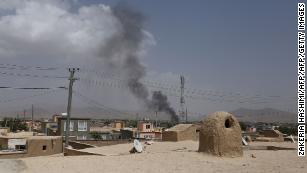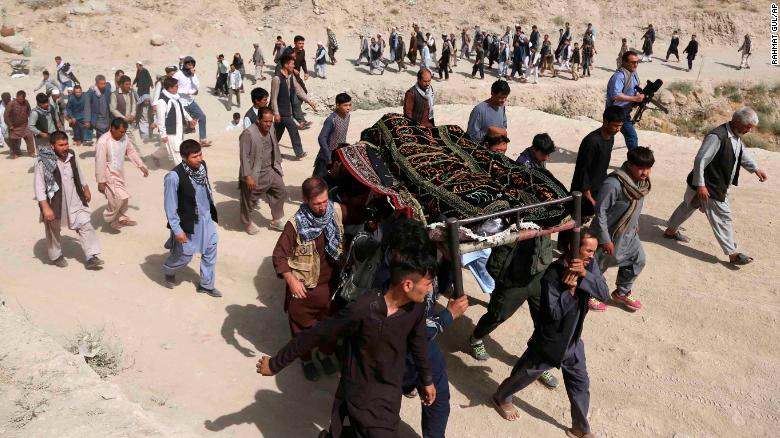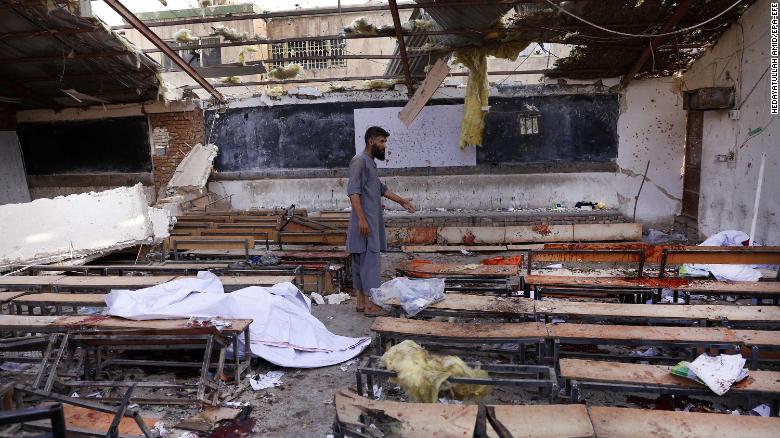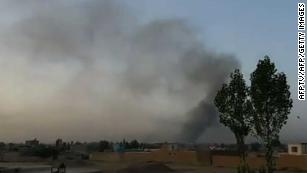
From the Website of CNN NEWS
links: https://edition.cnn.com/2018/08/16/asia/afghan-analysis-npw-intl/index.html
Trump's strategy is failing and the Taliban is winning
(CNN)Just consider this incomplete précis of the past six days.
The Taliban stormed into the strategic city of Ghazni on Friday, ultimately killing hundreds over at least four days of intense urban fighting and undermining the Afghan security plan of focusing on keeping population centers safe.
On Tuesday night, 39 soldiers died in Baghlan province when the Taliban overran their base. And 17 troops were also killed when their base in Faryab was also overrun.
On Wednesday, dozens died when a Shia education center was hit by ISIS. Dozens apparently also died when airstrikes hit an insurgent target in Farah.
 |
America's longest war takes worrying new turn |
Yet, despite this being the singular foreign policy issue that President Trump has personally delineated a lengthy strategy on, the White House has not appeared dismayed.
When asked, spokeswoman Sarah Sanders did not comment directly on Ghazni. The White House remains "committed to finding a political solution to end the conflict in Afghanistan," she said, and is "going to continue to review and look at the best ways to move forward."
Afghanistan has gone from being a Forgotten war, to the Ignorable one. Look at the list above and ask: exactly what has to happen to cause a sharp intake of breath?
Instead the onus appears to be on the West engineering a justifiable exit, or a discreet winding-down of the war.
An absolutely seminal, but almost unpublicized change happened in US policy over the past months: it has decided it's OK to talk directly to the Taliban.
While there's been no official confirmation, multiple sources have corroborated Taliban claims that they met with a senior US official recently in Doha.

Men carry the coffin of a relative who died in a suicide bombing that targeted a training class in western Kabul, Afghanistan.
Why does this matter? Because the US has sought peace talks with the Taliban for years, yet had one condition: it had to be between the insurgency and the Afghan government, with the US merely as a facilitator. The Taliban's leaders always wanted to talk directly to the "occupier." And now it appears they can.
We have no idea how these talks went, although there are signs there may be more. The major point is that the Taliban insurgents are in a position of strength, both on the battlefield and in the political consciousness of who they see as their adversary: the US and its NATO allies.
Hundreds have died in the past week, in perhaps the worst period of violence I can recall for years. Yet this bloodshed in America's longest war is barely registering on American TV screens.
The Pentagon has limited resources here. Intermittently, it is dragged into fighting the Taliban, as when its advisors helped order airstrikes to repel insurgents in Ghazni.
But there are around 14,000 US troops and some allies' troops still in Afghanistan. The US spends about $5 billion on Afghan security forces each year. Yet the Afghan army and police's main task -- as defined about a decade ago -- of becoming able to secure the country eludes them.
The US military's own figures show that the government controls about two-thirds of the population, a figure that has barely changed in the past year, despite an Afghan government goal of it rising to 80% by the end of 2019.
So where does this leave America's longest war? The Taliban is in its most radical incarnation for years. The al Qaeda-linked Haqqani network has been given the number two military position in its hierarchy.

A man inspects the scene of a suicide bomb attack in Kabul, Afghanistan, on Wednesday.
The Taliban's leader, Haibatullah Akhundzada, let his son carry out a suicide bombing last year in Helmand. The hope that it will choose a peaceful settlement compatible with the West's moderate desires for Afghanistan's women, and its minorities, is remote. But negotiations seem to be more and more urgent to the White House.
President Trump has said that "winning" is the goal, but -- much like his predecessors -- the precise metrics of what that looks like remain vague.
Does a government in which the Taliban has a substantial say -- and a countryside where its fighters roam freely -- constitute an acceptable compromise?
Does the Taliban's regular and at times effective persecution of ISIS -- known as IS-K, Islamic State Khorosan, as it persists -- mean it is a useful anvil upon which to hammer its far more vicious and inhuman rival?
What about parliamentary elections? Due in October, they will prove a reminder of the lofty democratic ideals NATO swung in with, and how President Ashraf Ghani is still technically in a time-limited power-sharing agreement with the man he fought the last presidential election with.
They are both due to face the electorate again in 2019 for another presidential vote, which will struggle to have a cleaner outcome than its two messy predecessors.
They are both due to face the electorate again in 2019 for another presidential vote, which will struggle to have a cleaner outcome than its two messy predecessors.
Barack Obama and Donald Trump both (eventually) deemed Afghanistan a war worth fighting. Obama threw at it the full range of US military might, under a perhaps self-destructive time limit. Trump applied much less might, with no apparent time limit. But slowly, it appears security erodes in Afghanistan, its once-safe capital now feeling ever more like a front line.
 |
| Taliban launches brazen attack on strategic Afghan city of Ghazni |
There is not an obvious military victory anywhere in sight. Instead the insurgency is metastasizing, giving ISIS a foothold, and the government is nearing surely yet another round of chaotic elections that risks undermining its legitimacy.
The White House is correct to focus on a negotiated settlement, but times have changed. The US and its allies have to be candid that this will not be the "win" on its terms that it hoped for. The Taliban knows it is winning the ear of perception, and that Western patience is as taxed as ever, and fatigue is rife.
Yet the hope for an Afghan people who have -- according to US military figures -- found themselves in the majority living in government-controlled areas, must be that the "win" that is declared doesn't see the insurgency exacting vengeance and control over their homes.
As we edge toward year 18, the West has forgotten why it first went to Afghanistan, is sketchy about why it stayed and is increasingly unsure about what it must do before it ultimately leaves.
CNN Website
Article Links
OTHER HUMAN RIGHTS PROMOTIONS WEBSITES
------------------------------------------------------------------------------------------------
THE GLOBAL WORLD PROMOTIONS
-------------------------------------------------------------------------------------------------
-------------------------------------------------------------------------------
---------------------------------------------------



































0 comments:
Post a Comment